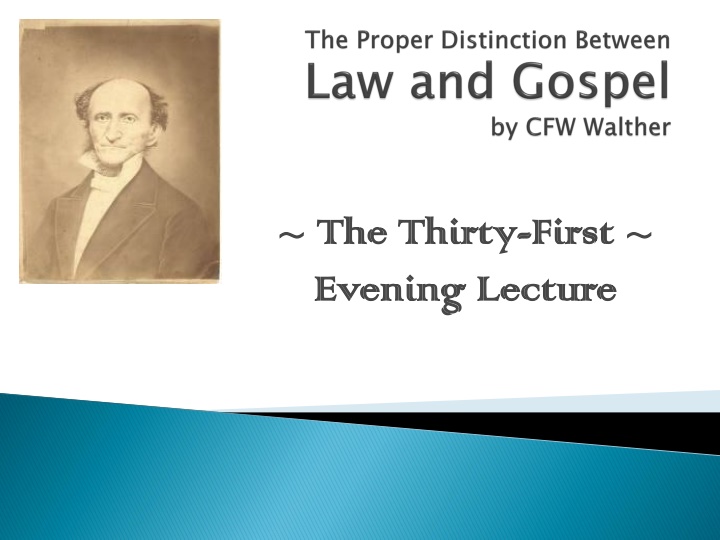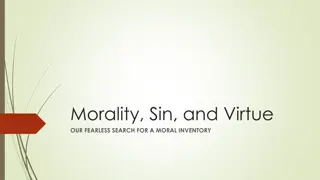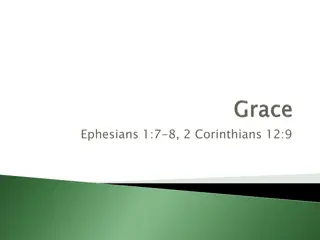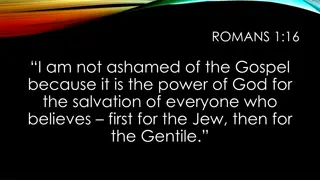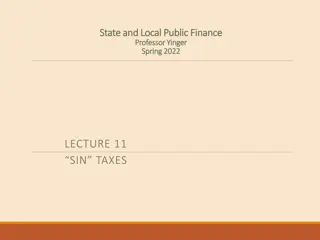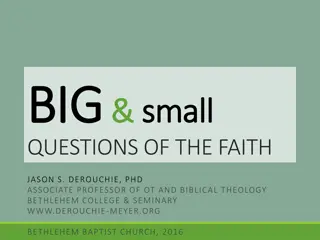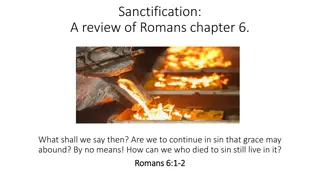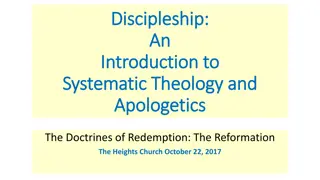The Nature of Sin in Believers & Non-believers
Sin is a critical aspect of human existence, yet its understanding varies among individuals. Delve into the discussions on the origin of sin, different perspectives on sin across philosophies, and the importance of acknowledging sin's severity to grasp the essence of the Gospel. Learn about mortal and venial sins, the impact on believers, and the significance of presenting sin truthfully to enable deeper spiritual reflection.
Download Presentation

Please find below an Image/Link to download the presentation.
The content on the website is provided AS IS for your information and personal use only. It may not be sold, licensed, or shared on other websites without obtaining consent from the author.If you encounter any issues during the download, it is possible that the publisher has removed the file from their server.
You are allowed to download the files provided on this website for personal or commercial use, subject to the condition that they are used lawfully. All files are the property of their respective owners.
The content on the website is provided AS IS for your information and personal use only. It may not be sold, licensed, or shared on other websites without obtaining consent from the author.
E N D
Presentation Transcript
~ The Thirty ~ The Thirty- -First ~ Evening Lecture Evening Lecture First ~
What do you need to be careful about when speaking concerning the sins of believers? How is a pilgrim attacked by a highwayman like a Christian who has sinned? What s the difference between falling into a sin and living in sin? 2
The fact that sin exists and the question how it originated. Even the more serious philosophers of pagan antiquity were occupied with this highly important and grave subject. But after all is told, they did not perceive the terrible abomination that sin is. 3
who do not know what sin is. Rationalists claim that man is naturally good and becomes evil and sinful only through evil examples. Others, like the pantheists, atheists, and materialists, claim that sinning is in no way worse than eating when you are hungry or drinking when you are thirsty. This blindness concerning sin is the chief cause of the almost universal rejection of the Gospel in our time. (!) 4
That he know how to depict for his hearers the true nature of sin in terms that are as plain and distinct as they are terrible, drastic, and impressive. Without a real knowledge of what an awful thing sin is man cannot understand and accept the Gospel. 5
In the fifteenth place, the Word of God is not rightly divided when the preacher speaks of certain sins as if they were not of a damnable, but of venial nature. 6
Sins which expel the Holy Ghost and bring on spiritual death are called mortal sins. 7
Venial sins are termed such as a Christian commits without forfeiting the indwelling of the Holy Spirit. They are sins of weakness or rashness; frequently they are called the daily sins of Christians. Helpful definition from Franz Pieper s Dogmatics: As to their effect, sins are divided into mortal sins and venial sins. Mortal sins are those which result in the death of the sinner. This term takes in all the sins of the unbelievers. In the case of the believers those sins are called mortal which force the Holy Spirit to depart from one s heart, which destroy faith. Venial sins are sins which, though they in themselves merit eternal death, our daily forgiven to the believer. They are also called sins of weakness. They do not drive the Holy Spirit from the heart, do not extinguish faith Any sin may become a mortal sin if we persevere in it against the admonition of our conscience. 8
The line is not drawn by the seriousness of the sin itself but rather by the absence of repentant faith. Since we cannot see the heart, we must be very careful about concluding that repentant faith is absent. The willful desire to continue in sin without repentance is the flesh driving out the Spirit-created new man. When in a "Christian" the struggle of the Spirit against the flesh has ceased and sin has dominion, this person has fallen from faith. 9
A preacher who does not preach both does not deserve the name of an evangelical minister, but is a false leader and is sowing the Gospel as if he were casting wheat into the ocean, where no crop can be raised. 10
The Lord had to fulfil every Law and every commandment in our stead! It is shocking in any man, poor, sinful worm that he is, to want to dispense with a single Law of God and to treat it as a matter of no importance. A true Christian manifests himself as a person who fears to commit a single sin. 11
The Lord also speaks of a person who shall teach men so. It is much worse when [the minister] preaches his lax views and leads men to perdition by his preaching. 12
Even for an idle word Christians must ask God s pardon with a contrite heart and promise to guard their lips better in the future. If God were not to forgive their idle words, these alone would damn them. There is no sin venial in itself. 14
If a person had kept nine hundred and ninety-nine out of the thousand commandments, he would be guilty of the whole Law. That applies to every one of the so-called venial sins. Jas. 2, 10: Whosoever shall keep the whole Law and yet offend in one point, he is guilty of all. 15
The blood of Jesus Christ, the Son of God, must have been required also for canceling the so-called venial sins. Therefore, venial sins in themselves must also be mortal sins (according to their nature, that is, even the slightest sin carries with it the sentence of eternal death). 16
he tears down the manifesto which a king has had posted in public and tramples upon it. 17
A true Christian is not like a brazen criminal who carries his head high; he is not hard-hearted, but contrite. If he is reminded of any word that God has spoken, he accepts it immediately with due humility. Anybody may utter a warning or a rebuke to a Christian, and it will be accepted. Without a broken spirit a person may talk ever so much about the Christian faith; it is all worthless. 18
When Christ says: He is in danger of the Judgment, He treats anger and murder alike. 19
All these texts prove that the so-called venial sins are not venial in themselves, in their nature, but damnable, mortal sins. 20
that no absolution is required for venial sins. Among venial sins the Romanists number sinful desires that do not materialize in acts. 21
to deny that a person sins even in his good deeds, that venial sins are such not by their nature, but solely by the mercy of God, or that sin remains in an infant also after baptism. 22
It is not a trifling matter to depart from the Law and will of God a hairbreadth, nor is the mercy of God which pardons venial sins a trifling matter. Let us beware of this pharisaical leaven! 23
securely snoring away in their sins and are not aware that they are committing gross sins. Any person who is not in constant fear of being full of mortal sins and does not act accordingly, will scarcely be saved. (!!) 24
Even good works cannot bear the scrutiny of God s judgment, but are in need of pardoning mercy. 25
Always remind yourselves that, if God were to deal with you according to His justice, you would belong in hell, not on a pleasant couch. 26
Sin is as great as He is who is offended by it. Since God is offended by sin, there is in sin an immeasurable wickedness and an immeasurable guilt. 27
